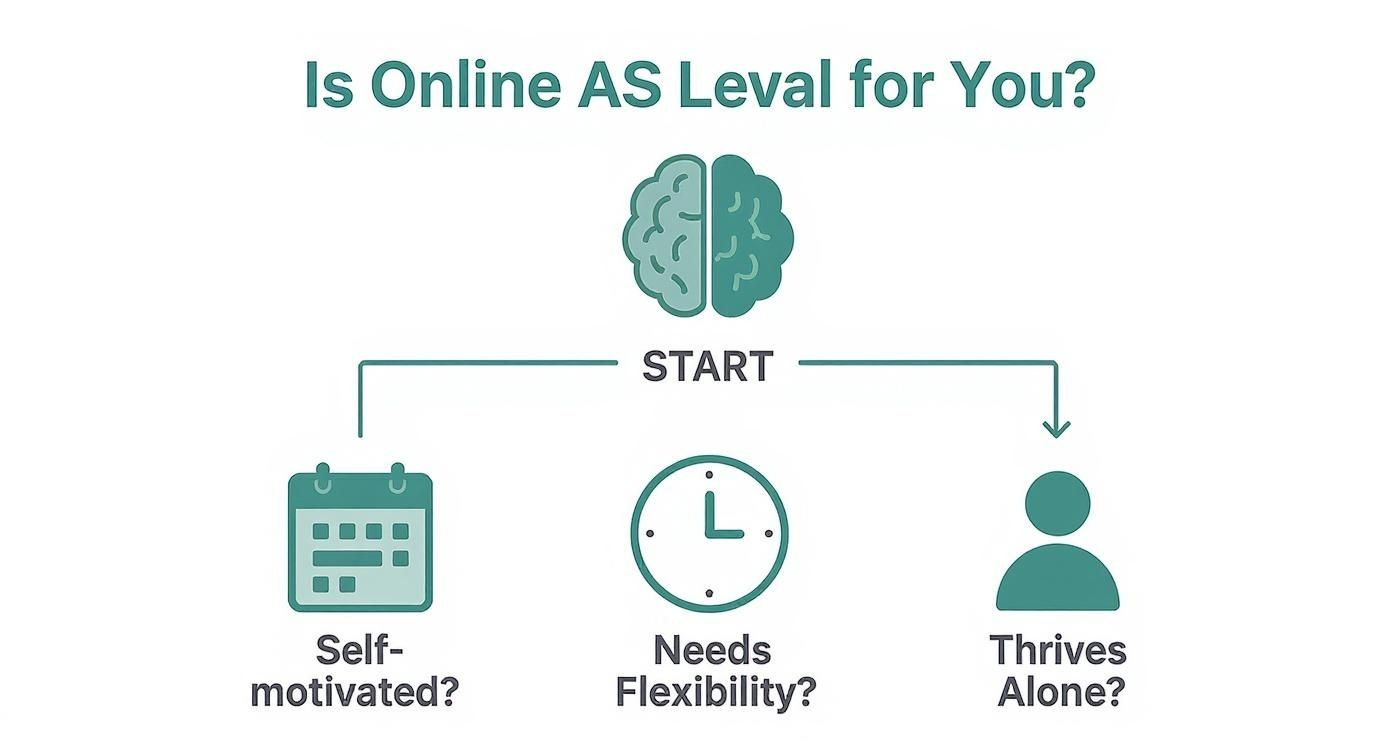Choosing the right educational path for your child is one of the biggest decisions a parent can make, filled with both excitement and a fair bit of worry. A distance learning AS Level offers a flexible, personalised route to a formal qualification, but the big question remains: is it the right choice for your family? This approach takes learning out of the traditional classroom and puts your child firmly in the driver's seat of their own academic journey, letting their unique needs and talents shine.
Is a Distance Learning AS Level the Right Choice?
Deciding on the best learning environment isn't just about weighing up a list of pros and cons. It’s about asking a deeper question: will this setting help my child truly flourish? Every child is unique, and what works wonders for one might be a struggle for another. The key is to put your child’s personality, learning style, and well-being at the very heart of the decision.
For many, the structure of a traditional school is a perfect fit. For others, it can feel overwhelming or restrictive. Imagine a dedicated young gymnast like Maya, who needs to balance five hours of training a day with her studies. A fixed school schedule just wouldn't work. Or think of Ben, a talented artist who feels stifled by the pace of a large class. He thrives when he can spend an entire afternoon diving deep into art history, something that distance learning makes possible.
Finding the Right Fit for Your Child
A distance learning AS Level can be a game-changer for many different types of learners. See if any of these sound familiar for your child:
- The Focused Student: For a child like Sam, the constant social buzz of a busy classroom can be overwhelming, triggering anxiety that makes it hard to learn. A quieter, home-based environment allows him to concentrate fully on his studies and absorb information without the background noise and emotional strain.
- The Paced Learner: Does your child grasp concepts in a flash and feel held back, or do they need a bit more time to let things sink in? Online learning allows them to set their own pace. A student like Chloe can re-watch a complex chemistry lesson three times until it clicks, without feeling the pressure of the class moving on without her.
- The Flexible Achiever: For students with serious commitments outside of school—whether it's competitive sports, artistic pursuits, or managing health needs—the flexibility of distance learning is priceless. It gives them the freedom to chase their passions without having to compromise on their education.
This decision tree infographic can help you map out whether your child has the key traits needed to succeed in an independent learning environment.

As the graphic shows, strong self-motivation, a real need for flexibility, and the ability to work independently are core signs that a student is likely to thrive with online AS Levels.
To help you weigh things up, here’s a quick comparison of the two main approaches.
Distance Learning vs Traditional Schooling At a Glance
This table breaks down some of the key differences you'll find between studying for an AS Level online versus in a physical school, focusing on what the day-to-day experience is actually like for a student.
| Aspect | Distance Learning Experience | Traditional School Experience |
|---|---|---|
| Pacing & Schedule | You set the pace. Study when you're most productive, fitting lessons around other commitments. | Follows a fixed timetable with set class times and break periods. |
| Learning Style | Ideal for self-starters who prefer to learn independently and explore topics in depth on their own. | Suited to learners who thrive on direct, in-person instruction and classroom discussions. |
| Social Interaction | Connect with tutors and peers through online forums, video calls, and dedicated virtual groups. | Daily face-to-face interaction with a wide range of peers and teachers. |
| Teacher Support | Get one-to-one support from tutors via email, messaging, or scheduled calls. | Access teachers during class, in scheduled office hours, or after school. |
| Environment | Learn from anywhere with an internet connection—a quiet home office, the library, or even while travelling. | A structured, physical campus with dedicated facilities like labs and libraries. |
Ultimately, neither approach is universally "better"—it's all about finding the best fit for your child's individual needs and circumstances.
A Growing Trend in UK Education
This move towards more personalised learning isn't just a niche idea; it's part of a much bigger trend. Distance learning at the A-level has seen a huge surge in popularity across the UK, with student enrolment jumping by over 30% between 2020 and 2025. And with 90% of learners saying they value the flexibility it provides, it’s clear this model is meeting a real demand for modern families. You can discover more insights about UK education statistics and see how this trend is reshaping the way we think about learning.
By putting your child’s needs first, you can figure out if a distance learning AS Level is not just another option, but the right option to help them build confidence and achieve success on their own terms.
A Look Inside Your Online AS Level Course

It can be hard to picture what studying for an AS Level from home actually looks like. Without the familiar rhythm of school bells and bustling classrooms, what does a typical week involve? Let's pull back the curtain on how a quality distance learning course creates an academic environment that’s both supportive and engaging for your child.
Imagine this: your child starts their day not with a frantic school run, but by logging into their own central online hub. This isn't just a website; it’s their digital campus. Everything they need is organised in one place, designed to feel structured yet empowering. For instance, Liam, a Year 12 student, can see his entire week's schedule for Physics, Maths, and History at a glance, with clear deadlines and links to all his resources.
This predictability helps many students feel secure, while also teaching them invaluable time management skills along the way. Seeing a progress bar fill up as they complete tasks can be a huge confidence booster, showing them just how far they’ve come.
The Core Learning Experience
The real heart of the course is its learning materials. Instead of trying to keep up in a busy classroom, your child gets to engage with a variety of resources designed for focused, independent study.
- Pre-recorded Video Lessons: Delivered by subject specialists, these can be paused, rewound, and re-watched as many times as needed. If your child needs an extra moment to grasp a tricky calculus formula or analyse a line of Shakespeare, they can take it without feeling rushed or left behind.
- Interactive Assignments: Many tasks offer instant feedback. Imagine your child completes a multiple-choice quiz on historical dates and immediately sees which answers were wrong, with pop-up explanations. This turns every task into a proper learning opportunity, not just a test.
- Digital Textbooks and Resources: Forget the stress of a forgotten textbook. All essential reading is online and accessible anytime, putting a rich library of materials right at their fingertips.
This approach puts your child’s needs front and centre. It respects their individual pace and gives them the tools to take ownership of their education, building a sense of responsibility and academic maturity.
The real beauty of a well-designed distance learning AS Level course is that it pairs flexibility with a robust support system. Your child is never truly alone; they are surrounded by a dedicated team whose entire focus is their success.
The Human Support System
One of the biggest worries for parents is whether their child will get enough support without a teacher physically present. It's a fair question, but quality online providers have built their entire model around answering it, often providing more personalised attention than a student might get in a class of thirty.
For example, when Aisha was struggling with an essay on The Great Gatsby, she didn't have to wait for the next lesson. She messaged her English tutor, Mr. Harrison, who sent back detailed, paragraph-by-paragraph feedback within a few hours.
There are usually two key people in your child’s support network:
- The Subject Tutor: This is their academic expert. If your child is struggling with cellular respiration in Biology or needs feedback on a History essay, the subject tutor is their go-to person.
- The Student Advisor or Mentor: This person looks at the bigger picture. When Aisha felt overwhelmed with her workload, her advisor helped her map out a revision timetable, breaking big tasks into smaller, manageable steps. This support was about her well-being, not just her grades.
This dual support structure ensures that both academic and pastoral needs are met. The sophistication of these online platforms is a huge reason for their growing success. Today, over 80% of UK schools and colleges offering A-levels have integrated some form of Learning Management System (LMS) into their teaching.
What's more, studies show that online learner retention can be significantly higher than in traditional settings, proving just how effective this supported, personalised model can be. You can read more about the growth of online education in the UK and see how it is changing learning for the better.
Finding an Accredited and Supportive Provider

Choosing a distance learning provider can feel like the most critical decision in this entire process. And it is. You aren't just buying a course; you're entrusting a partner with your child's education at a pivotal time in their life. The right choice can feel like a huge weight lifted, knowing your child is in safe hands.
Get it right, and you’ll have a true partner on this journey. Get it wrong, and it can lead to frustration, wasted time, and a real knock to your child's confidence.
The first, non-negotiable step? Check for accreditation. This isn't just a logo on a website; it's the official seal of approval that guarantees the qualification is worth the paper it's printed on. It’s the assurance that your child’s hard work will be recognised and respected.
For providers in the UK, this means you need to see that they are an approved centre for the major exam boards:
- AQA (Assessment and Qualifications Alliance)
- Pearson Edexcel
- OCR (Oxford, Cambridge and RSA Examinations)
These are the very same bodies that set the standards for every school in the country. A provider that works with them is a provider whose curriculum is up to scratch and whose qualification will be recognised by every university. Recognition from bodies like Ofqual (The Office of Qualifications and Examinations Regulation) adds another powerful layer of trust.
Looking Beyond the Logo
Accreditation is just the starting line. Once you’ve ticked that box, the real research begins. This is where you find out if a provider will simply teach your child or truly support them. It's about feeling confident that there's a real, caring person on the other side of the screen.
High exam pass rates look great in a brochure, but you need to know the story behind the numbers. A good provider won't just tell you what their students achieve; they’ll show you how they help them get there. For instance, do they offer one-to-one revision sessions before exams? Do they provide detailed, constructive feedback that helps students improve, rather than just a grade?
This brings us to the teachers. Who, exactly, will be guiding your child? Their tutors must be more than subject experts. They need to be masters of online teaching—a unique skill that requires energy, creativity, and the ability to connect with and motivate a student through a screen.
The Support System Checklist
When you start comparing providers, put the human element at the top of your list. Textbooks and learning platforms are important, but it’s the quality and accessibility of the support team that can make or break your child's experience and their love of learning.
A great distance learning AS Level provider understands that they aren't just delivering content; they are nurturing a young person's academic journey. Their support system should reflect this, offering both academic guidance and pastoral care to help students feel connected and confident.
Use the points below as a practical checklist. Ask these questions directly and compare the answers. This will paint a far clearer picture of what the day-to-day reality will look like for your child. Taking the time to learn more about the different subjects and support structures available for a full online A-Level will also give you a better sense of what excellence looks like.
Checklist for Vetting Distance Learning Providers
Use this table to compare potential AS Level providers and ensure they meet the crucial standards for your child's education.
| Checklist Item | Why It Matters | Questions to Ask |
|---|---|---|
| Tutor Qualifications | Your child deserves to be taught by an expert who can inspire them and answer tough questions with clarity. | "What are the qualifications of your tutors?" "Are they experienced in online teaching?" |
| Pastoral Care | Academic pressure is real. A dedicated support system helps with motivation, well-being, and study skills. | "Is there a student advisor or mentor separate from the subject tutor?" "How do you monitor student well-being?" |
| Response Times | When your child is stuck on a problem, a quick and helpful response prevents them from losing momentum and confidence. | "What is your guaranteed response time for tutor questions?" "How can students contact support staff?" |
| Community Features | Learning shouldn't be lonely. Forums or virtual groups help students connect with peers and feel part of a community. | "Do you have student forums or online social groups?" "Are there any group projects or webinars?" |
By asking these specific questions, you move beyond marketing slogans and get to the heart of what a provider truly offers. This careful vetting process gives you the confidence that you’re choosing a partner who will empower your child to succeed.
How to Create an Effective Home Study Environment
A successful journey through a distance learning AS Level hinges just as much on the home environment as it does on the course materials. It’s not just about finding a desk and a chair; it’s about creating a space—both physically and mentally—where your child feels supported, focused, and ready to learn.
When a child’s bedroom or the kitchen table suddenly doubles as their classroom, the usual boundaries can get a bit blurry. This makes it tough for them to switch into ‘study mode’ or, just as importantly, to switch off and properly relax. Think of a supportive atmosphere as your playbook for helping them build genuine independence and resilience.
Designing a Dedicated Study Space
First things first: carve out a specific area that is purely for learning. It doesn’t need to be an entire room, but it absolutely must be a space that mentally signals, ‘it’s time to focus.’ For example, a simple desk in the corner of a quiet room, equipped with good lighting and their necessary supplies, works perfectly.
Think of it like an athlete stepping onto the pitch; the environment itself prepares them for the task ahead. A designated study corner can have that same powerful psychological effect on a student.
Get your child involved in setting it up. Let them choose a comfortable chair or add a plant to make it their own. This small act of ownership can make them feel far more connected to their learning and more responsible for their space.
Building a Collaborative Schedule
Flexibility is one of the biggest perks of online learning, but without any structure, it can quickly become a source of stress. The secret is to build a weekly schedule with your child, not for them. This simple act of collaboration changes the dynamic from you being a manager to you being a partner in their success.
Kick things off by chatting about their natural energy levels.
- Are they a morning person who can tackle tricky maths problems before lunch? Let's block out 9 am to 11 am for that.
- Do they hit a creative stride in the afternoon? That's the perfect time for essay writing.
- When do they need a proper break? Schedule a walk, a chat, or some screen-free time to help them unplug and recharge.
By working with their internal clock, you help them work smarter, not just harder. A solid schedule should also ring-fence downtime. Make sure that breaks for hobbies, exercise, or just chilling out are treated as essential parts of the week. For families figuring out the best study arrangements, understanding the nuances of online homeschooling in the UK can offer some great context for creating these balanced routines.
The goal isn't to replicate a rigid school timetable. It’s to create a sustainable rhythm that balances focused study with the rest of life, teaching your child invaluable time management skills they’ll carry into university and beyond.
Your Role as the Chief Encourager
Perhaps the most critical part of the home study environment is the emotional atmosphere you cultivate. Your child will face challenges—procrastination, a tough topic, a dip in motivation—and how you respond is everything. Your role isn't to be a taskmaster; it's to be their biggest cheerleader.
Celebrate the small wins. Did they finally get their head around a difficult concept in Biology? Acknowledge their hard work with a simple, "I'm so proud of how you stuck with that." Did they stick to their schedule all week? Let them know you’ve noticed their discipline. This kind of positive reinforcement is what builds momentum and self-belief.
When they’re struggling, offer empathy before jumping in with solutions. A simple, "That sounds really tough, let's figure it out together," can be far more powerful than asking why an assignment isn't finished. This approach fosters trust and keeps the lines of communication wide open, making sure they always feel safe coming to you for support. This careful balance of independence and encouragement is what a successful distance learning AS Level experience is all about.
Practical Strategies for Student Success

Starting a distance learning AS Level course puts you firmly in the driver's seat of your education. This freedom is incredibly powerful, but it's also completely normal to feel a bit overwhelmed at first. The trick is to see self-discipline not as a restriction, but as the very skill that unlocks true flexibility and control over your studies.
Think of it this way: the more organised you are, the more freedom you actually have. By building smart habits, you create a structure that stops last-minute panic and lets you enjoy the real benefits of learning on your own terms.
Mastering Your Time and Focus
Procrastination is a challenge for every student, but you can absolutely beat it with the right tools. One of the most effective methods is the Pomodoro Technique. It's brilliantly simple: you set a timer and work in a focused 25-minute burst on a single task—no phone, no distractions. When the timer goes off, you take a short five-minute break.
After four of these cycles, you take a longer break of 15-30 minutes. For example, you could tackle 25 minutes of Maths problems, take a 5-minute stretch, do 25 minutes of History reading, take another break, and so on. This approach breaks down intimidating study sessions into manageable chunks, making it much easier to get started and keep your concentration sharp.
The goal isn’t to study for hours on end without a break. It's about making the hours you do study as productive and focused as possible, which protects your well-being and prevents burnout.
To truly excel, developing solid study habits is crucial. You can dive deeper into effective strategies for studying from home to build a routine that works for you. These skills will not only help you smash your AS Levels but will also prepare you for the demands of university and your future career.
Embracing Proactive Communication
One of the biggest pitfalls in distance learning is struggling in silence. When you're stuck on a concept or unsure about an assignment, it's tempting to think, "I'll figure it out later." But 'later' often turns into a much bigger problem down the line, causing unnecessary stress.
Your tutors are there to help you succeed. Sending a quick email with a small question as soon as it pops up is far better than waiting until you feel completely lost. It shows you're engaged and taking ownership of your learning journey.
Think of your tutors as your academic partners. They want to see you do well, but they can't help if they don't know you're finding something tricky. Here are a few simple tips:
- Be Specific: Instead of saying "I don't get it," try, "I'm having trouble with the section on cellular respiration; could you explain the Krebs cycle again?"
- Attach Your Work: If you’re asking for feedback on an essay draft, attach the document so your tutor has all the context they need.
- Be Polite and Patient: Remember to thank them for their time and understand that they're likely helping other students too.
Becoming a self-directed learner is a skill that will benefit you for the rest of your life. Check out our guide on how you can become an amazing self-directed learner to master this essential skill.
Building Your Online Community
The 'distance' in distance learning AS Level doesn't have to mean isolation. You're part of a wider community of students who are on the exact same journey, and connecting with them is one of the best ways to stay motivated and feel supported.
Join your provider's student forums. These are brilliant places to ask questions, share study tips, and realise you're not the only one finding a particular topic difficult. For instance, you could post, "Has anyone found a good video that explains covalent bonding?" and get helpful replies from your peers. You could even take it a step further and create a virtual study group with a few classmates using video conferencing tools to quiz each other before a test.
This sense of connection is a huge part of why online learning has become so popular. In fact, a recent survey highlighted that convenience and self-paced study are massive draws. The study found that 84% of respondents chose online learning for its convenience, a factor that is especially important for AS-Level students juggling intense academic pressure.
Navigating Exams and University Applications
The final hurdles in any AS Level journey are the exams and, for many, the university application process. It’s completely natural to feel a bit of anxiety about these steps, especially when you’re studying outside a traditional school. But with a clear plan, these final stages can feel empowering rather than intimidating.
The first practical step is booking the exams themselves. As a distance learning AS Level student, your child will sit their exams as a private candidate. This simply means you’ll need to find a local school or college that is also an approved exam centre and register with them. It’s a pretty straightforward process, but timing is everything—make sure you contact centres several months in advance as places can fill up fast.
Securing Your Exam Place
Finding a centre is simpler than it might sound. The major exam boards, like AQA and Pearson Edexcel, have search tools right on their websites to help you find approved locations nearby.
A few key tips to keep in mind:
- Start Early: Begin your search at least six months before the exam season kicks off. This prevents a last-minute panic.
- Contact Multiple Centres: Get in touch with several schools or colleges to compare their private candidate fees and check availability.
- Confirm Deadlines: Always ask for their specific registration and payment deadlines, as these can sometimes differ from the national ones.
Once you’re registered, the exam centre handles all the admin, making sure your child’s exam experience is exactly the same as any other student's.
Standing Out to Universities
One of the biggest worries we hear is: how do universities view a distance learning AS Level? The answer is simple: they see it as an equal. An accredited online qualification holds the exact same weight and UCAS points as one earned in a traditional school. Admissions tutors care about the grade, not how it was achieved.
In fact, your child’s experience can be a huge advantage. They’ve developed skills that are absolutely essential for success at university—independence, resilience, and incredible self-motivation. For example, in a personal statement, your child could write: "Managing my own AS Level studies in Psychology taught me to be a disciplined, self-directed learner, skills I am eager to apply to undergraduate research."
Your personal statement is the perfect place to showcase these strengths. Frame the experience not as an alternative path, but as a deliberate choice that demonstrates maturity and a proactive approach to learning.
For students aiming for higher education, a compelling personal statement is non-negotiable. A great starting point is to review these powerful personal statement examples to see how you can refine your own and highlight the unique skills gained through online study. By focusing on the resilience and discipline required, your child can turn their distance learning journey into a compelling story that makes their application truly stand out.
Frequently Asked Questions
Let's tackle some of the most common questions we hear from parents and students about the distance learning AS Level journey. We want to clear up any lingering doubts so you can move forward with total confidence.
Are Online AS Levels Respected by Universities?
Yes, absolutely. An AS Level earned online from an accredited provider is awarded by the very same exam boards—like AQA and Edexcel—that service physical schools. To UCAS and universities, they are identical in value and academic rigour.
In fact, many admissions tutors see it as a real advantage. A student who has successfully managed their own study schedule has already proven they have the self-discipline and independent research skills needed to thrive at university. It tells a story of maturity and readiness for higher education.
How Much Tutor Support Does My Child Actually Get?
This is one of the most important questions you can ask, as the answer separates a good provider from a great one. Your child should always have a dedicated, subject-specialist tutor they can reach out to with academic questions. For example, if they're stuck on a maths problem at 8 pm, they should be able to send a message and expect a clear, helpful response the next morning.
But it goes beyond that. Top providers also offer scheduled one-to-one calls, group webinars, and in-depth written feedback on assignments. When you're researching, be direct: ask them, “What’s your typical response time for tutor queries?” The answer will tell you a lot.
The best providers understand that support isn't just about academics. It's about making sure students feel seen, heard, and encouraged. The goal is to create a support system so strong that a student never feels isolated on their learning path.
What if My Child Feels Isolated or Falls Behind?
This is a valid concern, and any reputable provider will have strong systems in place to prevent it. A well-designed course will always include a suggested schedule, which gives students the structure and routine they need to stay on track and feel secure.
Beyond that, student forums and online communities are brilliant for helping learners connect. If your child does start to struggle, their student advisor might proactively reach out to check in. For example, if they notice an assignment is overdue, they won't just send a reminder; they'll ask if everything is okay and offer to help create a catch-up plan. This ensures your child always feels part of a connected, supportive community that genuinely cares about their well-being.
At Queens Online School, we place your child's needs at the centre of everything we do, providing a supportive and accredited environment for them to achieve their academic goals. Discover our online AS Level courses and see how we can support your family's educational journey.

